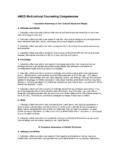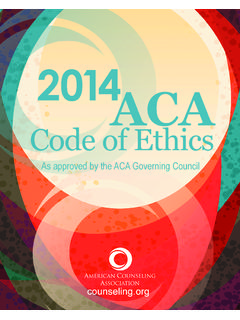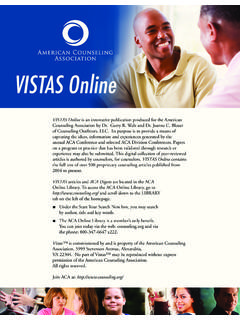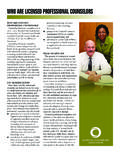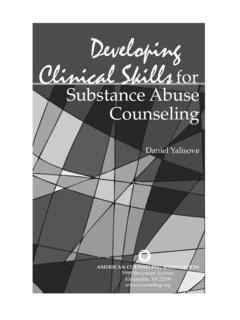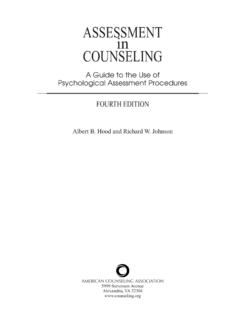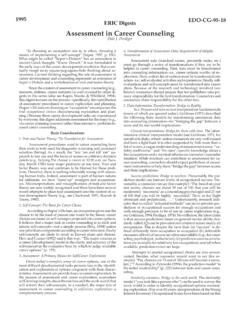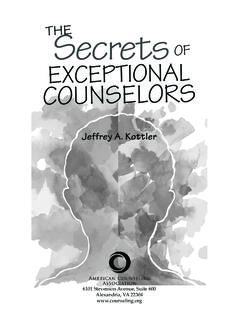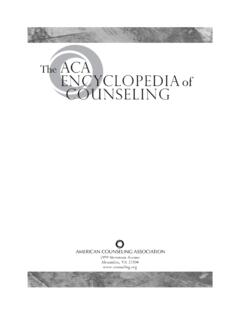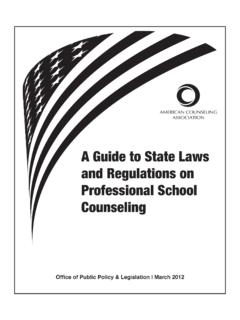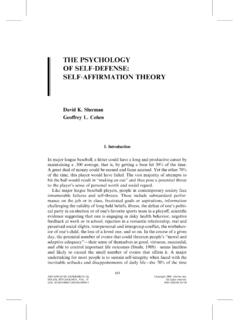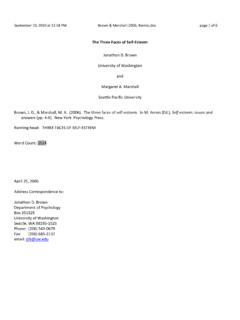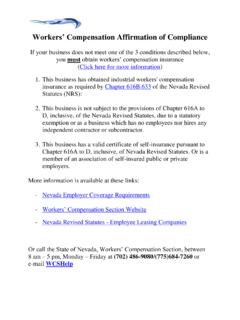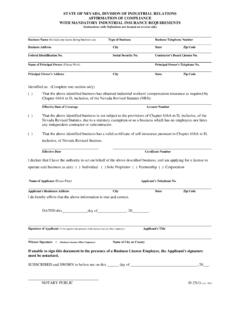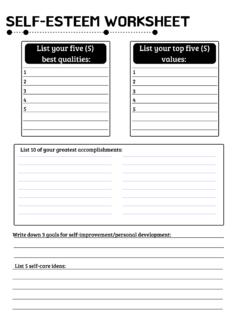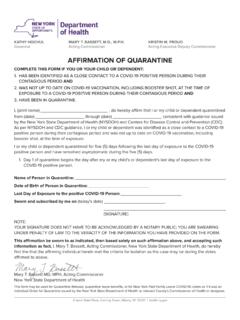Transcription of Three Tiered Model Toward Improved Self-Awareness and …
1 Article 30 Three Tiered Model Toward Improved Self-Awareness and self -Care Angel R. Dowden, Jeffrey M. Warren, and Hasseim Kambui Dowden, Angel R., is an Assistant Professor of Counselor Education at North Carolina A&T State University. Dr. Dowden s research interests include qualitative methodologies, school counseling, supervision, and multiculturalism in counseling. Warren, Jeffrey M., is an Assistant Professor of Counselor Education at University of North Carolina Pembroke. Dr. Warren s research interests include school counselor consultation and clinical supervision.
2 Kambui, Hasseim, is an Assistant Professor of Counselor Education at Florida A&M University. Dr. Kambui s research interests include African counseling and cultural identity development. The American Counseling Association (ACA) 2005 Code of Ethics encourages counselors to practice self -care and strive Toward Self-Awareness . When counselors engage in practices that foster wellness and awareness , they are better positioned to provide effective services to clients (Warren, Morgan, Morris, & Morris, 2010). The Introduction of Section C of the ACA Code of Ethics (ACA, 2005), indicates, counselors engage in self -care activities to maintain and promote their emotional, physical, mental, and spiritual well-being to best meet their professional responsibilities (p.)
3 9). Furthermore, ACA (2010) offers support to counselors via their Web site ( ) by providing resources aimed at increasing Self-Awareness and wellness. The Council for the Accreditation of Counseling and Related Educational Programs (CACREP, 2009) includes standards for counselor education programs that emphasize self -care strategies (Section ) and Self-Awareness (Section , e.). Students in accredited programs should acquire a basic understanding of self -care strategies as they relate to the role of the counselor. Programs should also ensure students develop a keen sense of Self-Awareness and an understanding of the impact of attitudes and beliefs on the counseling relationship (CACREP, 2009).
4 Draft #2 of the 2016 CACREP Standards also highlights the importance of self -care and awareness as components in counselor-training programs. Weiss (2004) suggested counselors-in-training that learn self -care strategies benefit in educational pursuits and later as professional counselors. By focusing on Self-Awareness and self -care, counselors enhance their clinical effectiveness, as well as overall well-being, (Warren et al., 2010). Rowland (2009) suggested counselors can practice self -care and create stress-free zones by utilizing self -talk, meditation, or physical activity.
5 Ideas and Research You Can Use: VISTAS 2014 2 While ACA (2005, 2010) and CACREP (2001, 2009), including the 2016 Standards (draft #2), emphasize the importance of counselors developing Self-Awareness and self -care strategies, instruction and assignments focused on these critical aspects of development are often absent in the curricula of accredited programs (Christopher, Christopher, Dunnagan, & Schure, 2006). Counselor educators have made several attempts to directly infuse self -care and Self-Awareness in program curriculum. For example, participation in a course focused on personal growth through mindfulness led students to report significant changes in levels of stress, training, and personal life (Christopher et al.)
6 , 2006). Yager and Tovar-Blank (2007) suggested ten strategies counselor training programs can implement to foster self -care practice and Self-Awareness among counselors-in-training. While there are various approaches for addressing self -care and Self-Awareness of pre-service counselors, none have become conventional components in counselor preparation. Based on a perceived need for a universal approach to developing self -care strategies and Self-Awareness , this article offers a flexible, evidence-informed Model for supporting the educational and professional pursuits of pre-service counselors.
7 A detailed overview of the theoretical premise of the Model is provided followed by a step by step presentation and case example. The Model can be implemented in varied contexts and extended towards counselors of various developmental A Model for Self-Awareness and self -Care This Three -step Model utilizes a developmental approach to enhance Self-Awareness and self -care of pre-service counselors. Additionally, this Model is theoretically based in cognitive behavior therapy (CBT). CBT is an approach emphasizing the modification of thoughts in an effort to change emotions and behaviors (Longmore & Worrell, 2007).
8 Each step incorporates an evidence-informed strategy utilized in CBT. Specifically, each strategy emphasizes self -monitoring while focusing on cognitive, emotive, and behavioral processes. self -monitoring is an individual s ability to monitor, identify, and appraise one s reactions, whether cognitive, behavioral or emotional (Holifield, Goodman, Hazelkorn, & Heflin, 2010). The strategies employed in this Model include self -checks, self -talk, and self -journaling. Each strategy is presented in greater detail below. The strategies and processes espoused in this Model provide pre-service counselors ways to reduce or minimize stress incurred when providing counseling.
9 Philosophically, the Model highlights the importance of self -monitoring as a means of improving both Self-Awareness and self -care. In this Model , Self-Awareness and self -care are facilitated when counselors identify and appraise cognitive, emotive, and behavioral reactions that present during and after counseling services. Through this process, pre-service counselors become keenly aware of who they are and/or who they aspire to be, while also determining what it takes to maintain their perceived self . While self -monitoring enhances Self-Awareness and self -care, it also heightens interpersonal skills such as empathy, which proves effective when providing counseling services (Crews et al.)
10 , 2005; McMurran, Fyffe, McCarthy, Duggan, & Latham, 2001). Ideas and Research You Can Use: VISTAS 2014 3 Tier 1: self -Checks self -checks can be a first step in the self -monitoring process. self -checks are brief opportunities to stop and check on oneself by cognitively thinking about emotional well-being (Baird, 2011). self -checks are reminiscent of the stop and think process commonly referred to in CBT (McMurran et al., 2001) and Rational Emotive Behavior Therapy (Ellis & MacLaren, 2005). Potentially stressful situations frequently occur when providing counseling services.
